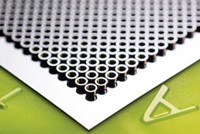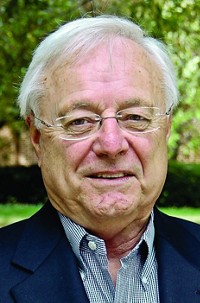Advertisement
Grab your lab coat. Let's get started
Welcome!
Welcome!
Create an account below to get 6 C&EN articles per month, receive newsletters and more - all free.
It seems this is your first time logging in online. Please enter the following information to continue.
As an ACS member you automatically get access to this site. All we need is few more details to create your reading experience.
Not you? Sign in with a different account.
Not you? Sign in with a different account.
ERROR 1
ERROR 1
ERROR 2
ERROR 2
ERROR 2
ERROR 2
ERROR 2
Password and Confirm password must match.
If you have an ACS member number, please enter it here so we can link this account to your membership. (optional)
ERROR 2
ACS values your privacy. By submitting your information, you are gaining access to C&EN and subscribing to our weekly newsletter. We use the information you provide to make your reading experience better, and we will never sell your data to third party members.
Business
Fred Regnier
Hands-on approach drives chemistry professor’s entrepreneurial efforts
by Celia Henry Arnaud
August 20, 2012
| A version of this story appeared in
Volume 90, Issue 34
“If you really believe in something, the only way to really take it to the world is to be involved and commercialize it yourself,” says Fred E. Regnier, a chemistry professor at Purdue University who has helped start five companies since 1990. “Each one of those companies was something I believed in.”
COVER STORY
Fred Regnier
Regnier, 74, got his start in the commercial realm with PerSeptive Biosystems, which he cofounded with Noubar B. Afeyan in 1990. At the time, the Purdue professor was also an adjunct professor in the process engineering group at Massachusetts Institute of Technology, where Afeyan was a graduate student. They shared a desire to speed up process-scale separations, so they started a company to develop polystyrene chromatographic materials—which they dubbed POROS particles—to do just that. The company name was based on “perfusion separations.”
Back then, entrepreneurial academics took time off and were involved in day-to-day operations and decision making. Regnier served as chief scientific officer at PerSeptive.
“I learned that’s probably not a good idea and not even necessary” to be so involved, Regnier says. “I discovered very quickly that I had research instincts, but I didn’t have product development instincts. I didn’t have the instincts for keeping all the arms of a product development program going simultaneously and folding them together.”
That might be true, but Regnier and the rest of the PerSeptive team were able to rapidly expand the company. In 1992, the company had about $200,000 in sales. That figure had grown to more than $100 million by 1998, when PerSeptive was acquired by instrument company Applied BioSystems, which has since been bought by Invitrogen, now called Life Technologies.
“PerSeptive was an incredible learning experience,” Regnier says. “I got to see how marketing and sales work,” he notes. It drove home, he explains, that you have to understand why the world is not able to move forward on something—you have to find the fundamental reason for this blockage. “If you find a way to solve that problem, you probably have a commercial product.”
Regnier has applied the lessons he learned from PerSeptive to all his companies since then, including his current venture. Originally founded in 2004 as QuadraSpec, the company changed its name and its business plan in March 2010, becoming Perfinity Biosciences. Located in Purdue Research Park, in West Lafayette, Ind., the company has four employees and is funded by a mix of private and venture investors.
Although Regnier serves on Perfinity’s board, he has chosen not to play an executive role. He describes himself as “a founder who drops in all the time.”
The company’s goal is to automate proteomics sample prep. “Mass spectrometers are able to sequence a peptide in milliseconds,” Regnier says. “But guess what? It takes 15 to 24 hours to get the sample ready. And that sample preparation method hasn’t changed much in 50 years.”
Perfinity Biosciences
Year founded: 2004 as QuadraSpec; renamed and reorganized in 2010
Services: Proteomics sample prep
Number of employees: Four
Source of start-up funds: Individual investors and venture capital
Profiled founder’s current role in company: Member of the board
Advice: Understand fully what you bring to the company.
Perfinity speeds up that process by simplifying the sample. Biological samples contain many thousands of components. Perfinity uses antibodies in a process called immune selection to pull a small number of specific proteins from a sample and then digests them with an immobilized enzyme reactor (IMER) prior to analysis by mass spectrometry. Sample prep takes only 10 minutes.
Even with only four employees, Perfinity has been able to make and sell a product. The company sells its selector and IMER technology through the Perfinity Workstation marketed by Shimadzu. “Today they run in Shimadzu, but they could run in anybody’s box,” Regnier says.
Perfinity isn’t looking to expand its number of employees yet. “We’re able to make a product and have a pretty substantial impact with that product with a very small number of people,” Regnier says. “Even when you have money, you don’t go out and carelessly increase your burn rate.”
At this point, Regnier doesn’t know what Perfinity’s endgame will be. Many companies avoid the costs of building a sales force by being acquired by a larger company. “The further you get from the invention and the making of the product, the less the start-up people know about it,” Regnier says. “Being acquired is not a bad thing, because at some point you outgrow what you’re good at.”
If Regnier could go back and give his younger self some advice, it would be this: “Understand fully the small thing inventors bring to the company. Don’t overestimate your ability to understand and do business.” Most important, he says, “vet your ideas with really good businesspeople.”





Join the conversation
Contact the reporter
Submit a Letter to the Editor for publication
Engage with us on Twitter